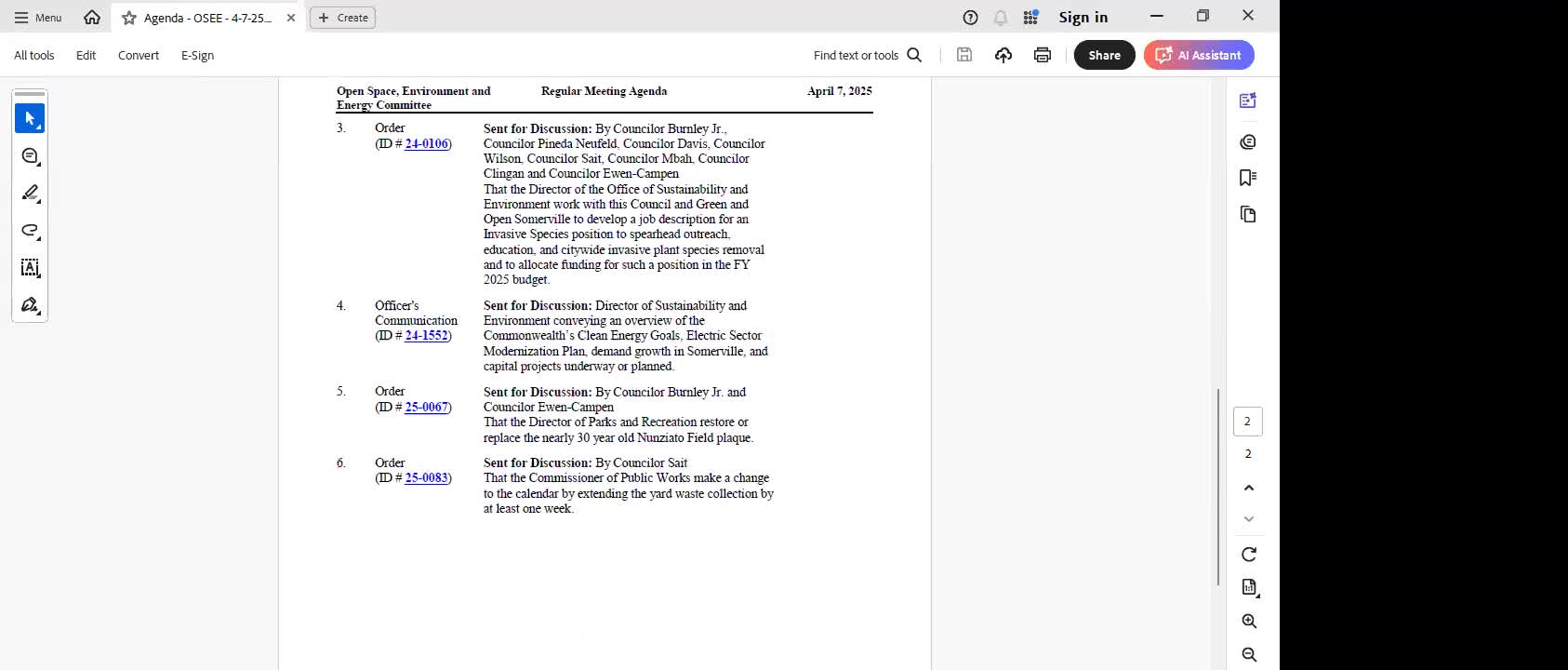Somerville committee hears Eversource on grid modernization, supply‑chain risks and potential rate impacts
Get AI-powered insights, summaries, and transcripts
Subscribe
Summary
Eversource representatives updated the Somerville City Council committee on April 7 about the utility’s Electric Sector Modernization Plan and the company’s planning for substation, distribution and underground‑cable upgrades needed to support decarbonization and electrification.
Eversource representatives updated the Somerville City Council committee on April 7 about the utility’s Electric Sector Modernization Plan and the company’s planning for substation, distribution and underground‑cable upgrades needed to support decarbonization and electrification.
City officials said they want timely public communication if project cost or timing pressures translate into higher utility bills for ratepayers. “I will be unsurprised if capital or project cost increase or if project timelines lengthen,” Councilor Davis said, urging Eversource to notify the public if those pressures would pass through to monthly bills.
The utility described supply‑chain and cost pressures that it says are already affecting procurement. “Since COVID, we continue to experience supply chain challenges, that without question, I think is impacting our purchasing strategy,” said Jason Wright, community relations, Eversource. Wright and system planners pointed to continuing long lead times for major substation equipment and possible geopolitical impacts on specific materials.
Why this matters: the city faces near‑term demand from commercial and lab development and long‑term load growth from potential residential densification. The committee sought clarity on whether planned projects such as the Prospect Street substation (Station 402) and other capital work now under way could be delayed or see cost increases that might ultimately be recovered through state mechanisms and appear on customer bills.
On the projects now under construction, Eversource said some major equipment was already ordered, which may reduce immediate exposure to supply shocks. “It might not have that bigger impact, at least on the immediate projects,” said Juan Martinez, Eversource system planning, noting that other projects further out in the pipeline could still face longer lead times. He added that some equipment lead times “are 4 years, 3, 4, 5 years.”
On the Prospect Street expansion (Station 402) timeline, Jason Wright said the transformer installation is ongoing and the utility projects the transformer will be energized in early second quarter of next year. He also described community‑engagement steps the utility intends to take during construction: “we have a special project engagement team… phone calls, dedicated emails, door hangers, dedicated websites, dedicated phone numbers,” he said.
City officials discussed rate protections the municipality already has. “In Somerville, we have the Community Choice electricity program, and that program has rates locked in through January of 2028,” Director Christine Blais, Office of Sustainability and Environment, told the committee, noting that the program can shield residents from short‑term statewide rate volatility.
On capacity for future housing growth, Martinez said the proposed substation upgrades include spare capacity intended to cover a 10‑year planning horizon: “in terms of substation capacity… we should be okay in the next 10 years.” He added that distribution‑level upgrades are location‑specific and typically have shorter lead times of one to three years.
Committee members pressed the utility on the link between capital costs and delivery charges. Eversource said that costs for many projects are recovered over the lifetime of the assets and are borne across state ratepayers, not only by Somerville customers.
The committee agreed to keep the item in committee and asked Eversource to return with periodic updates as federal and state policies, funding and market conditions evolve.
